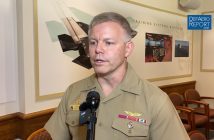Sen. John Boozman, R-Ark., discusses the importance of the Halifax International Security Forum, Sen. John McCain’s legacy, NATO, President Trump’s rhetoric and policies, and much more at the 10th annual Halifax International Security Forum in Nova Scotia, Canada. Our coverage at this 10th annual forum is sponsored by L3 Technologies and Leonardo DRS.
Senator John Boozman
Chairman, Military Construction Subcommittee
Halifax International Security Forum
November 2018
Vago Muradian: Welcome to the Defense and Aerospace Report. I’m Vago Muradian here at the Halifax International Security Forum in Nova Scotia, Canada, one of the leading gatherings of military, economic, diplomatic and civil society leaders from around the world. This on the 10thanniversary of this gathering. Our coverage here is sponsored by L3 Technologies and Leonardo DRS, and we’re honored to have with us Senator John Boozman, the Republican from Arkansas who is the Chairman of the Senate Military Construction Subcommittee. Sir, thanks very much.
It was a great press conference. Very bipartisan show of support here. Why is this conference and other conferences so important from your standpoint?
Senator John Boozman: Well, this is a great security conference. This is one that Senator McCain championed and was a big part of but it’s become one of the premier events in the world. So you do two things. You learn so much about what’s going on, the perception of your allies as to what they’re thinking, and then again, just being able — you change the world through personal relationships, so you’re creating those. And both of those things are very, very important.
The fact that we have so many members from the Senate here, again, very bipartisan. We had a couple that had problems, couldn’t get here because of weather and personal problems and things like that. So it’s been very positive.
Mr. Muradian: It’s really been incredible to see Cindy McCain and the outpouring, the award in Senator McCain’s name. What’s the Senate feel like without having him there to champion some of these very important issues? Especially on democracy and human rights?
Senator Boozman: They had a little movie about him before the award was given. I said, you know, the movie was great, seeing it, but I didn’t like it at all because I consider myself a tough guy, and you know, tears were coming in my eyes and things like that, you know, in the sense of not liking those tears. But you know, he is greatly missed, and will be missed in the future. He was a guy that spoke his mind which is so very important; was great about getting discussions started; and the fact that they named this award after him I think really is very special and I know she appreciated it.
Mr. Muradian: Is that also one of the reasons why so many Senators have suddenly geared into the issue? Because there were some years when it was Senator McCain and a much smaller delegation here. This was an extraordinary show for us. I mean seven Senators here. We have one Member of Congress, Mike Gallagher, who’s a real up and coming Afghanistan war vet. Did his passing sort of drive Senators to sort of day hey, you know what, we’ve got to get out and we’ve got to trumpet this message more strongly?
Senator Boozman: It may have a little bit, but I think it’s more so just the schedule. You know, people were worn out from the election, and this was a way to come and get your mind off of that. Again, focus on something that’s so, so very important. So I think it was that more than anything.
Right now we have a NATO conference going on at the same time, NATO Parliament. And there’s many Members of the House — Democrats and Republicans — in town also. So I think it’s a great show of force. I think we as Senators and Representatives understand too, that the Europeans need to see our presence and need to know that we are totally committed to the alliance and realize how special it is.
Mr. Muradian: There were several questions from reporters about whether the rhetoric, and especially some of the harsh rhetoric from the President saying some of the policies, some of which are very very positive. How do you see that? You know, is the American brand tarnished from your standpoint at all by this? And does the rhetoric cause unnecessary strains and challenges in the relationship?
Senator Boozman: The President’s a tough negotiator. I think the idea of saying look, you know, we’re paying our part. You need to pay your part. We’ve provided lots of, you know, benefit through the years. We’re willing to step up, do what needs to be done. We don’t like the free rides. That’s okay. It brings on discussion.
The good news is that people are paying more are a result of that because he had the, you know, the courage or whatever to bring it up. Some people don’t like that, but I think that’s very positive.
As far as what we’re actually doing, when you look at it, I’m, as you mentioned, the Subcommittee Chair on Military Construction. A year ago we spent $300 million; we’re going to spend $791 million, well over double, almost three times as much. And the good news also about that is, a lot of that is partnerships with other countries. You look at a place like Poland. We’re prepositioning supplies there. So you put the supplies there, but you need warehouses and things like that. There’s a great partnership going on with these countries.
So we’re taking the money that we’re spending, but we’re also making it such that it’s worth many more dollars because they’re matching or exceeding them.
Mr. Muradian: And certainly the trend since 2014 has been up with all of our NATO allies, but clearly, there are folks even in foreign governments who do give the President credit for adding to that pressure.
On that almost doubling of your budget, what are some of your key priorities in that spending package?
Senator Boozman: I mentioned the Poland initiative, and that would be right at the top, making it such that if we did have a situation with the Russians in Poland that the supplies are there. It makes it so much easier for training exercises, which are so important, so that you don’t have to physically take all of that stuff from the United States overseas.
Mr. Muradian: And what about in the Pacific?
Senator Boozman: The Pacific also. Lots of work going on there.
Mr. Muradian: And last question, because I’m getting the hook here, is the budget outlook, right? I mean there was a sense that this budget was going to be the last strong, big budget but the President has directed a reduction. The debate is at what point do we end up? Do we go from 733 to 700 or 716? What’s your sense now that the Democrats have the House? How does the spending dynamic go? And do you think that there could be a shutdown in December, for example, over, for example, the Wall?
Senator Boozman: Well, Office of Management and Budget has their ideas as to what we need to be spending and things like that. Congress has the final say. I would say that there’s good bipartisan support. We’ve worked so hard to increase military spending because of the threats that are out there, and so I think there will be great reluctance to back away from that now that we’re moving in that direction.
I don’t know what’s going to happen. I don’t think anybody wants a shutdown. I think that we’ll be able to work with our counterparts in the House and the Senate and reach some sort of agreement. I don’t see a shutdown looming. Probably there will be a compromise somewhere in between the $5 billion and the $1.6 that’s there now.
Mr. Muradian: John Boozman, Republican Senator from Arkansas, Chairman of the Senate Military Construction Subcommittee. Sir, thanks very very much. Best of luck and I look forward to seeing you in Washington.
Senator Boozman: Thank you so much, as always, for having me. I appreciate you.
30




